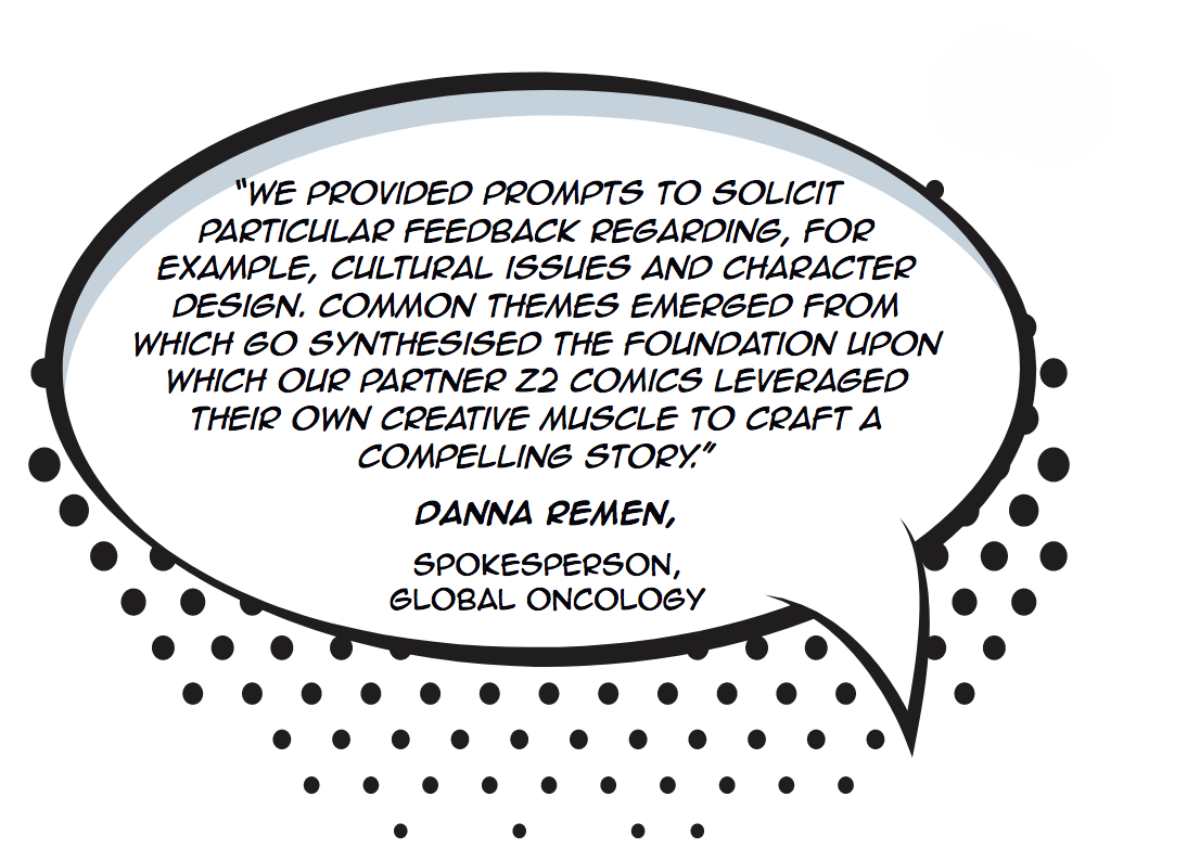The Cancer Comic Book

Global Oncology’s comic book for cervical cancer is taking cancer awareness to young Nigerians in a format they can relate to
By Christina Tom JOSE
A persisting challenge that has always hampered cancer awareness campaigning is a lack of proper understanding of the disease among the public. It is not that information is unavailable, but there is a dearth of means to deliver it to the common man in a way that it remains etched in their minds. Global Oncology’s new comic book, aimed at spreading awareness about cervical cancer, is a prime example of such a creative means. Global Oncology (GO), a US-based non-profit organisation, has been around since 2011. Founded by Ami S Bhatt, MD, PhD, and Franklin W Huang, MD, PhD, the organisation is focused on making cancer care and treatment available to patients in low to middle income countries, where 80 per cent of cancer deaths are estimated to occur.

Global Oncology has tie-ups with healthcare providers and patients, educating and supporting them while making care more accessible. One of the focal points for GO is providing cancer education materials (CEM) to patients who have been diagnosed by cancer, focusing more on treatment rather than prevention. These CEM uses simple, picture-based communication, and is also available for caregivers and family members of the patient. While the CEM is for those affected, there is a broader audience to whom the message of prevention has to be taken. That is where this comic book comes into play. Using a comic book format to present the information makes critical medical information an interesting read, especially for teenagers and young adults. The pictorial representations make this information easier to understand and remember. Cervical cancer is preventable through a vaccine for the human papilloma virus (HPV), and the comic book is a significant step to spreading significant information about its prevention.
The book is designed to target the young population of Nigeria, from the ages of 12 to 30. It introduces three central characters, Aisha, Naeto and Timi, along with a doctor named Dr O Obi. “We learned from our partners in the entertainment field that there is a demand for comic books among Nigerian adolescents and young adults, solidifying our reasoning for targeting this age group with a message encouraging uptake of the HPV vaccine,” says Danna Remen, a spokesperson for GO. A team of professionals, including doctors, patients, communications experts, comic book writers/designers, artists, and NGO leaders, worked behind the book.
“We provided prompts to solicit particular feedback regarding, for example, cultural issues and character design. Common themes emerged from which GO synthesised the foundation upon which our partner Z2 Comics leveraged their own creative muscle to craft a compelling story.”Danna Remen, spokesperson, global oncology
A third of them were from African countries. “Our first objective was to narrow in on a particular topic under the cancer umbrella that would benefit highly from the broad attention we expect to garner using the comic book format,” explains Remen. “There was unanimous agreement that prevention of cervical cancer is a pressing need in Nigeria as it is a leading cause of death there.” A small Brooklyn-based graphic novel company called Z2 comics created the artwork for the comic. The work was divided into four main categories: medical, creative/artistic, promotion, and distribution.

Members of a core steering committee contributed their expertise and opinion to each area of work. “We provided prompts to solicit particular feedback regarding, for example, cultural issues and character design. Common themes emerged from which GO synthesised the foundation upon which our partner Z2 Comics leveraged their own creative muscle to craft a compelling story,” states Remen. The reach of this comic book is not to be restricted to Nigeria alone. GO has plans of making it available in other countries, including Portugal, Jamaica, Kenya, Belize and the US. The demand for the comic book is expected to rise in the coming months.
Global Oncology’s cancer awareness activities do not stop with merely providing educational material. The GO Map is the most complete and accessible online database for everything oncology related. It is an interactive platform on which users anywhere can blog, share articles, post events and even upload their project data. “We hear from map users—some of whom are providers attempting to deliver care in the most challenging settings—that The GO Map reminds them that they are not alone,” Remen shares. Along with this, GO is currently working on creating a public oncology unit in Belize, called the Global Oncology – Directly Observed Care (GO-DOC), the first such unit in the country. Done in partnership with the government and healthcare entities, the unit will make erstwhile expensive cancer treatment available to the general public in an affordable manner.
The book is designed to target the young population of Nigeria, from the ages of 12 to 30. It introduces three central characters, Aisha, Naeto and Timi, along with a doctor named Dr O Obi.
Global Oncology:Founded by Ami S Bhatt & Franklin W Huang
Founded in:2011
Projects:
Directly Observed Care
Cancer Education Materials
On The Ground in Nigeria
The GO Map
GO-Young Professionals
Alliance
Past Projects:
GO Talks
GO Symposium
Belarus Palliative Care
Initiative
















